#les Siècles
Explore tagged Tumblr posts
Text
Mercredi, pour changer, je suis allée écouter voir un concert Ravel, sur le thème de l’Espagne, au Théâtre des Champs Elysées. Je savais que le moment ne serait pas banal. Les Siècles, un des meilleurs orchestres français, en résidence au TCE, allait servir des oeuvres qui s’amusent de chaque instrument en les faisant sonner autrement. Les musiciens jouent sur des bois, des cuivres, des cordes, … d’époque ce qui signifie pour Ravel, des instruments du début du 20ème siècle. Forcément, ça oblige l’auditeur à faire un RAZ de sa mémoire, jusque dans les oreilles. La flûte traversière ou la piccolo, le basson, le hautbois, la clarinette, et les saxophones soprano et ténor si présents chez Ravel, notamment dans le Boléro, semblent plus en retrait, moins prononcés. Les notes se montrent légères, solubles dans l’air, l’instrument sort un son sur la pointe des pieds, ce qui appelle une acuité des sens de l’auditeur. Pour être encore plus attentive, j’ai sauté du strapontin que j’avais réservé, dans un fauteuil libre, et j’ai rejoint le chemin de la musique aux influences espagnoles de Ravel. François-Xavier Roth, le chef en titre des Siècles, était absent du programme et de la scène, c’est Adrien Perruchon qui figurait sur les écrans puis qui a pris place sur le podium. J’y reviens plus bas… Le programme purement symphonique énonçait Alborada del Gracioso (Aubade du bouffon), Rapsodie (sans h) Espagnole, le Boléro et la délirante comédie chantée, l’Heure Espagnole, sur un texte de l’écrivain journaliste Franc-Nohain, père de Jean Nohain. Cette dernière œuvre, créée en 1911, est d’une totale drôlerie, une série de quiproquos autour d’une femme espagnole ayant rdv avec son amant pendant que son mari horloger part réparer des horloges en ville. Tout est une question de timing, avant ou après l’heure, et patatras…Elle finira par préférer le muletier au poète qui parle trop et qui n’agit pas. Une bonne morale pour une histoire qui ne l’est pas trop, à méditer ! FX Roth a raté le rdv pour des questions de sorties inappropriées de son instrument…Le chef envoyait à ses musiciennes et musiciens, des photos de “sa meat et de ses vege”, comme disent poétiquement les Anglais, après les concerts, une manière particulière de les remercier et de faire part de son exultation … Le Canard Enchaîné ou Enchanté a publié un article le même jour, puisque nous étions mercredi, la source venait des “membres” de son orchestre. La boucle est bouclée ! Pendant ce temps, le train roule et le bouquet de pivoines (l’une d’entre elles s’appelle Hawaï) cueilli en Normandie, s’en fout. Chaque fleur s’épanouit, au jour le jour, et un florilège musical circule entre mes orteils et mes oreilles …

View On WordPress
0 notes
Text
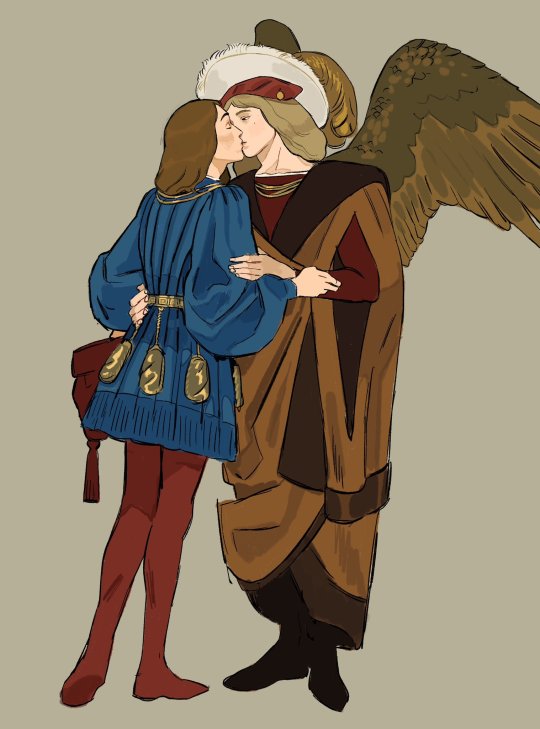

L'amant et l'Amour
14K notes
·
View notes
Text

Joseph Apoux (1846–1910) - Le Punch, c. 1890s
from 'Rêveries Fantastiques' series
#joseph apoux#le punch#rêveries fantastiques#19th century art#19th century#fin de siècle#symbolism#art#illustration#etching#decadent movement
443 notes
·
View notes
Text

fitzconte but make it belle époque for @strangebabushka
#some ppl here make every ship lesbian and I’m their weird cousin who turn everything into het#now they are very into symbolism & fin de siècle occultism and going through russian revolution#this has so little to do with canon#im almost sorry#transfem jfj as always since im like this hehe ❤️#the terror amc#the terror#fitzconte#henry le vesconte#james fitzjames#fitzgirl#dundy le vesconte#art tag
328 notes
·
View notes
Text

Devil paper opener, bronze, 19th century
#bizarre au havre#art#devil#paper opener#bronze#dark#sculpture#19th century#le diable#coupe papier#XIX siècle
100 notes
·
View notes
Text

source : @cheminer-poesie-cressant
.
C'est l'humain chez l'oiseau qui est fascinant !
Et nous vivons dans l’ignorance de ce qui unit,
de ce qui embrasse la vie générique d’un tout.
Et nous perdons la saveur des liens qu’on ne tisse pas.
L’origine de l’ange a sans doute à voir avec cette réplique.
.
(Dans la portée des ombres, extrait)
© Pierre Cressant
(mercredi 12 octobre 2005 - lundi 2 décembre 2024)
#poème#poésie#poètes sur tumblr#french poetry#poésie contemporaine#poètes français#dans la portée des ombres#l'oiseau#l'humain#l'humanité#le vivant#vie terrestre#petite histoire philosophique de la vie#philosophie#ange#figure de l'ange#art photography#photographers on tumblr#renaissance#renaissance française#XVIème siècle#fresque
31 notes
·
View notes
Text
belle journée pour se rappeller qu'alain delon était une ordure absolue <3
#tous les médias qui l'encensent en mode c'était l'homme du siècle#je souhaite la mort de personne et je me réjouis de rien mais c'est important de s'en souvenir#mais pas d'hommage pour un égocentrique raciste misogyne et partisan de l'extrême-droite
21 notes
·
View notes
Text
Même la nuit la plus sombre prendra fin et le soleil se lèvera.
Victor Hugo, Les Misérables
English: "Even the darkest night will end and the sun will rise."
#victor hugo#les misérables#auteur français#littérature française#xixème siècle#citation#littérature
108 notes
·
View notes
Text
Also I've been watching some interview with the vampire to see what was all this then, and I have to say, while its good its also so painful to me not because of the complicated relationships between the characters but because I have to sit here and play along in pretending this blond bitch is french like QU'ESTCE QUE TU DIS MON GARS
#this is so aggressively “french written by someone who isnt” that at times im like putain pourquoi le monde est aussi obsédé de nous bordel#but also sometimes it works so. well.#aussi QUI en auvergne appelle son fils “lestat”? non jen ai rien à faire que c'était des nobles genre ya quatre siècles.#ive seen someone in a the tags of a post being like “he's so french 😫” NON IL L'EST PAS PUTAIN#louis' okay tho.#tagging later
16 notes
·
View notes
Photo






kitty chicha
credits : rawpixel; anton nikolaev; freeject; sick again
#kitty chicha amatayakul#kitty chicha amatayakul avatars#kitty chicha#kitty chicha avatars#girl from nowhere#avatars rpg#avatars 640x400#les photos sont dans mon pc depuis 1 siècle et j'ai la flemme de retourner internet pour les crédits...
154 notes
·
View notes
Text
Writing in French with your English keyboard and having your 'santé!' become 'Santa!'
Sure, sure, Bonne Santa
#not like christmas is over#upthebaguette#frenchblr#french tumblr#french side of tumblr#la question du siècle: ' 'Bonne Santa' désigne la mère Noël ou le père Noël qui fait du drag?'
23 notes
·
View notes
Text

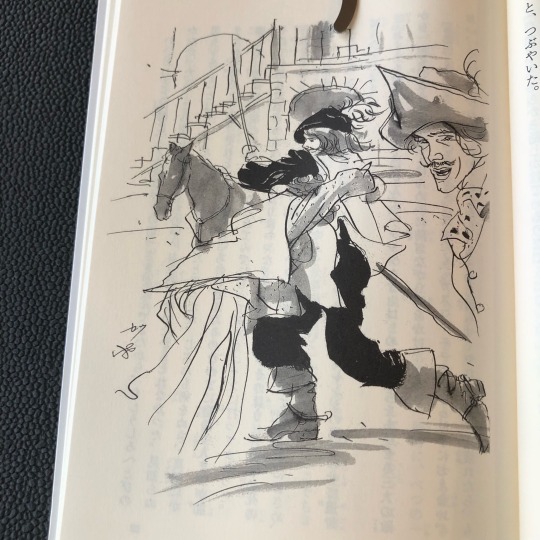
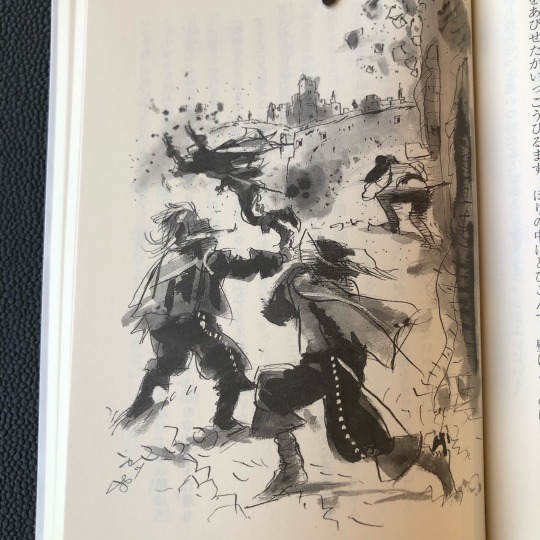
久しぶりに『三銃士』を読みました📖
わざわざ岩波少年文庫で読んだのは、長沢節氏によるファッション画に等しいお洒落なイラストも眺めて楽しむためです😍✨
『一人はみんなのために、みんなは一人のために』、そして愛と友情、協力と独断、共有と秘密、信頼と裏切り、日常と冒険、王侯貴族と庶民、武官と官僚、富裕と貧困、政治と駆け引きなど、何もかもが詰め込まれているのに不思議と集中してしまう作品です✨
若い頃は、何事にも一所懸命で純粋なダルタニャンがかわいくて好きでしたが、今は大雑把なようで配慮を欠かさない男気のあるポルトスがお気に入りです🥰
#三銃士#les trois mousquetaires#アレクサンドル・デュマ#alexandre dumas#大デュマ#Dumas père#フランス文学#littérature française#19世紀#xixe siècle
90 notes
·
View notes
Text
13 : s'adonner à leur passe-temps favori
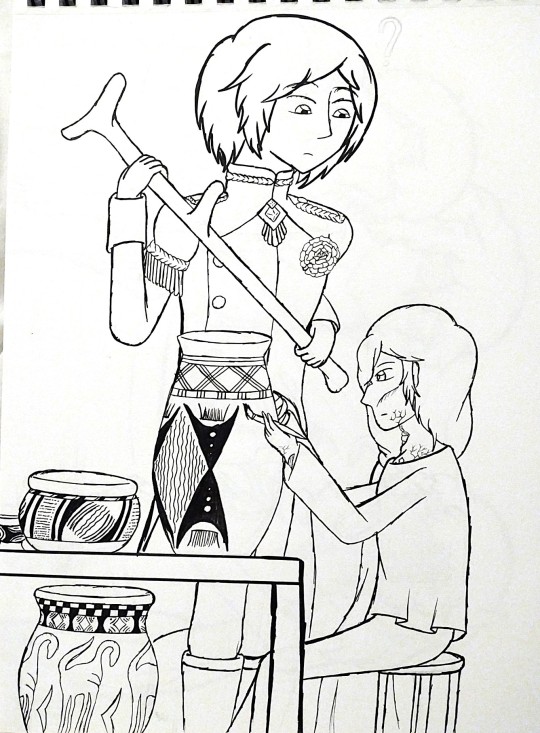
Lorenz observe son ancêtre, le Brave de la Terre Mettius Gloucester Paenitens dit les Mains Fertiles, exercer son métier : potier.
Nouveau jour, nouvelle paire d'ancêtre et de descendant avec Lorenz qui rencontre son ancêtre Paenitens, qui n'est pas pas exactement comme il l'imaginait.
Paenitens est un homme très calme, très silencieux et consciencieux qui aime par dessus tout travailler tranquillement seul dans son atelier sans qu'on vienne le déranger, tout en étant très fier de son travail qui est également sa passion (sa relation avec sa sorcellerie a une base... compliquée). Il n'y a pas grand-chose qu'il déteste plus que quelqu'un qui viendrait le voir en lui demandant "mais pourquoi tu n'utilises pas tes pouvoirs pour faire tes pots plus vite et plus ?" car, il considère que c'est bâclé le travail et que ces céramiques faites sans efforts n'ont aucune valeur. S'il vous refile une céramique fait comme ça, c'est qu'il veut vous voir dégager de son atelier, s'il ne vous a pas déjà fait dégager en déplaçant la terre sous vos pieds. Il peut être gentil et il aide son village sans souci en rendant les terres plus fertiles mais, il est juste pas très sociable et aime sa tranquillité, même si sa langue se délie assez facilement pour parler métier et technique. C'est ce qui lui a permis de se lier d'amitié avec Indech (il est l'un des deux seuls Braves à avoir rencontré un nabatéen avant la guerre dans ma fanon), ils pouvaient passer beaucoup de temps à travailler ensemble et ils ont fini par devenir amis avec le temps.
Alors, je vous laisse imaginer le contraste décapant avec Lorenz quand ils se rencontrent !
Si de visage (pour la moitié de visage qui reste à Paenitens), ils se ressemblent beaucoup tous les deux, Lorenz est aussi flamboyant, fanfaron et très fier de son rang que Paenitens discret, taiseux et modeste. Il est également très étonné de sa relative pauvreté : les légendes autour de Gloucester ont gardé le fait qu'il soit potier de base, il est même reconnu pour ça et être un excellent peintre, même si c'est assez peu évoqué pour surtout se concentrer sur sa sorcellerie qui a rendu les sols de Gloucester extrêmement fertiles, et Lorenz s'imaginait plus quelqu'un ayant un atelier avec plusieurs petites mains, et lui ne s'occuperait que de la peinture des pièces les plus prestigieuse. Alors se retrouver avec un homme habillé très simplement qui fait tout lui-même dans son coin et qu'il n'a pas d'employé à part une aide chez lui, et qui se définit lui-même comme étant d'abord un potier, un membre de son peuple puis un sorcier... voilà quoi, d'un côté, il est extrêmement fier d'avoir un ancêtre aussi talentueux mais de l'autre, il ne s'attendait clairement pas à ça.
Autre point qui l'étonne, c'est son handicap très lourd. Paenitens boite vraiment, même avec sa canne (qu'il a fait tenir à Lorenz pour éviter qu'elle ne tombe tout le temps), marche difficilement, et a beaucoup de mal à utiliser le côté droit de son corps, qu'il cache constamment sous ses très longs cheveux de sorciers (la coiffure de Lorenz après l'ellipse viendrait également des représentations de son ancêtre qu'il imite).
En fait, ce qui a rendu infirme Paenitens - Ultor à ce moment-là, littéralement "le vengeur" -, c'est qu'il n'a pas suivi les règles de la sorcellerie dont la règle fondamentale est que le sorcier doit toujours payé le prix de sa sorcellerie lui-même, règle qu'il n'a pas suivi lorsqu'un jour, ivre de colère et de vengeance contre "la créature de feu" et trouvant qu'il ne progressait pas assez vite, il a tenté d'utiliser une petite partie de l'énergie vitale d'un animal pour se renforcer lui-même. Dès qu'il a essayé, sa sorcellerie s'est complètement retourné contre lui et au lieu d'ajouter une fierté, elle s'est mise à dévorer son côté droit. Si Kelon (l'ancêtre de Claude, d'une cité voisine, même si c'est deux peuples différents) ne l'avait pas senti et arrivé aussi vite grâce à ses ailes, Paenitens serait mort à cause de sa transgression. En punition, tout son côté droit est à découvert avec quelques morceaux de muscle qui reste mais, c'est surtout un squelette de métal (qui vient d'une fierté pour le coup, ça a renforcé son corps) qui n'a plus beaucoup de force, d'où le fait qu'il est beaucoup de mal à se mouvoir et a besoin d'aide dans sa vie quotidienne (c'est vieux mais, il ressemble au dernier dessin dessin sous la coupe - attention, horreur corporel -). La sorcellerie, c'est dangereux, il faut respecter les règles sinon, elle ne vous ratera pas, ce qu'il a appris à ses dépends.
Il ne vivait que pour sa vengeance à ce moment-là, il voulait se venger de la "créature de feu" qui avait chassé son peuple de sa ville (même s'il oublie assez vite que si elle a fait ça, c'est parce que son peuple a lui a capturé et asservi tous les hommes de son peuple à elle en son absence - car ils ne l'avaient pas écouté mais ça, c'est une histoire pour plus tard - et qu'elle ne les a pas asservis, elle les a "juste" chassés étant donné qu'une fois vaincu après un coup pareil et vu qu'ils cherchent à s'installer, on met à mort les têtes pensantes et on réduit en esclavage tous les autres afin d'avoir de la main d'oeuvre docile, et au lieu de leur voler tout ce qu'ils avaient, elle les a laissés partir avec une grosse partie de leur bétail et de la nourriture pour éviter qu'ils meurent de faim et grand mécontentement de son propre peuple à elle, elle a pris un sacré risque et a surement dû imposer sa décision aux siens au lieu de la voter) et reprendre ses terres mais là, d'un, il se retrouve lourdement handicapé en pouvant à peine marcher correctement, de deux, ses pouvoirs vont nettement moins bien se développer qu'ils ne le devraient après une telle transgression, et pour finir, Kelon lui dit clairement qu'il ne pourra jamais vaincre sa "créature de feu", elle le fera juste fondre avant et elle est bien trop forte pour lui, tout en lui expliquant que dans sa cité, normalement, quand on s'installe quelque part, s'il y a déjà un autre peuple qui habite-là, on le réduit en esclavage une fois vaincu mais, pas l'esclavage antique classique où vous avez un espoir de vous faire libérer, non, là, y a quasi aucun espoir d'être affranchi un jour, on leur inculque bien qu'ils sont inférieurs et juste des serviteurs avec tout un tas de mesure humiliantes et coercitives et pour faire taire ceux qui se plaignent trop fort ou qui ont un caractère trop fort, il y a la cryptie à la fin de l'agoge (entrainement des enfants de citoyens) des meilleurs élèves, où ils doivent tuer des hilotes sans se faire prendre.
Kelon connait très bien cette "créature de feu" alors, il sait qu'elle est contre l'esclavage et encore plus qu'on traite les hilotes de cette manière et que dans la situation où ils étaient tous, ça devait la meilleure des solutions : les chasser en les laissant en vie avec de quoi survivre pendant un moment, et en empêchant les hommes de sa cité ne les poursuivre pour les asservir. On est chez des grecs pour ces deux-là, c'est très dur d'imaginer qu'on puisse avoir des relations d'égal à égal (c'est quand même eux qui ont inventé le concept d'hégémon qui domine tous les autres et est au sommet tout en profitant bien au passage) alors que deux peuples aussi différents puissent se mélanger, même si Kelon et "la créature" peuvent y penser en se disant "on peut peut-être cohabiter sans s'entretuer tout le temps, même si c'est très difficile" sans que l'un puisse asservir l'autre ou l'écraser, c'est quasi impossible pour leurs contemporains, les cités grecques se battaient entre elles pour des arbres coupés au mauvais endroit quand même.
Même eux, on leur dit que dans le futur, des peuples très différents à leur époque vont se retrouver dans le même pays et que leur continent va être divisé en trois territoires dirigés par de grandes familles de manière héréditaire, ce serait limite lunaire (moins pour elle mais quand même, elle trouverait ça profondément stupide de laisser autant de pouvoir à un seul roi sans un deuxième pour qu'ils s'entretuent tous les deux pour avoir la primauté sur l'autre, et sans les éphores pour les réguler et les calmer quand ils font n'importe quoi, et beaucoup plus pour Kelon qui vit dans une démocratie), surtout que les grecs sont très jaloux de leur indépendance. C'est même assez général cette manière de pensée que "on peut se supporter de loin mais, faire des alliances entre peuples très différents les uns des autres, on va pas pousser, on se connait tous assez peu et on est en concurrence pour le territoire, sauf peut-être des alliances militaires pour dégager un voisin un peu trop agressif et encore, c'est vraiment de circonstance et ça ne dure pas" alors, ça ne vient pas tout seul l'idée de cohabitation entre deux peuples, encore plus entre un qui est de culture grec / spartiate et un de culture bien plus celte et gauloise pour celui de Paenitens (c'est par exemple le cas pour Simplex, Pertinax et Laeta, respectivement ancêtre des Blaiddyd, Fraldarius et Dominic qui sont extrêmement proches, ils ont passé des années comme conservi, des compagnons d'esclavage, ont survécu à la servitude ensemble, sont devenus des sorciers ensembles et même mené une révolution qui abolira l'esclavage dans le peuple de Simplex ensemble mais, ils ne se diront jamais "amis" de leur vie jusqu'à la veille de leur mort car, ils savent qu'il y a toujours un risque que leurs peuples entrent en guerre les uns contre les autres et qu'ils ne veulent pas les trahir, même si ça les déchirerait de s'affronter les uns les autres). Ce qui maintient un semblant de paix entre les cités, c'est souvent qu'il y a des sorciers dans l'une des deux et pas dans l'autre, ce qui impose rapidement un rapport de force et qu'en général, les sorciers sont assez sages pour éviter d'utiliser leurs pouvoirs à la guerre histoire de ne pas faire trop de dégâts, même si c'est un équilibre fragile, et quand Némésis passe, puis les adrestiens passent en interdisant la sorcellerie en les pensant complices de Némésis et des agarthans (et tombant dans le piège de ces derniers au passage visant à brûler tout ce qui les a remplacé à la surface, que ce soit les créations de Sothis ou ses "enfants adoptifs"), ça rabat toutes les cartes avec des peuples qui profitent que le sorcier d'à côté meurt à force de ne pas pouvoir s'entrainer pour venir les terres du voisin plus petits et crée un chaos monumental. Enfin bref, revenons à l'histoire de Paenitens quand Kelon lui explique qu'il ne pourra sans doute jamais vaincre son ennemie et que lui-même se rend compte qu'il ne pourra surement pas faire le voyage.
En plus de tout ça, c'est sans compter qu'il va bientôt avoir une nouvelle arrivante dans leur coin : Daphnel, Brave des Vents surnommée par son peuple (d'origine duscurienne, là où Kelon arrive d'Almyra et est de culture grec pour un équivalent dans notre monde, et celui de Paenitens est descendu de Sreng en quête de meilleures terres et poussé par d'autre peuple, et il est d'inspiration gauloise... oui, ça va être compliqué pour s'entendre, surtout qu'aucun des peuples des trois ne parlent la même langue ou une langue proche pour ne pas arranger les choses) "la Bourrasque enragée" quand elle le retrouvera à cause de son tempérament de feu et plutôt sanguin, également bien remontée contre le peuple de Paenitens après que ce dernier ait souvent attaqué son peuple à elle pour capturer des gens et les réduire en esclavage, elle compris, ce qui a poussé son peuple à quitter leurs terres pour arriver sur les futurs terres de Daphnel - et en ayant plus beaucoup de nourriture à emporter vu qu'ils se faisaient piller tout le temps -, et elle adore cette "créature de feu" qui la libérer de sa cage d'esclave et élevée donc, elle ne le laissera pas trop s'approcher ou passer par ses terres. Comment dire qu'au début et pendant un bon moment, c'est compliqué.
Quand ils se rencontrent ces deux-là et qu'ils finissent par apprendre comme ils peuvent la langue de l'autre pour se comprendre un minimum (même si c'est surtout Paenitens qui doit se mettre au grec vu que c'est la langue maternelle de Kelon et que Daphnel le parle couramment aussi, même si c'est un dialecte différent du sien), elle ne lui fera aucun cadeau, encore plus en voyant bien qu'il a utilisé de la magie interdite, et lui mettra bien la tête au fond du plat pour lui rappeler que ouais, niveau esclavagisme et traitement des esclaves, ils étaient particulièrement horribles, même pour l'époque, et les traitaient aussi comme des animaux, ce qui a poussé son peuple à elle à se barrer à force d'être harcelé et pillé, et sa "créature de feu" a eu des problèmes quand elle les a laissé filer ainsi avec de la nourriture vu que normalement, les vivres, tu les gardes jalousement pour toi, et parce que les siens ont trouvé qu'elle s'était comportée en tyran pour avoir décidé pour tout le monde sans consulter personne. Sous le règne du peuple de Paenitens, Daphnel a quand même fini elle-même dans une cage sans nourriture pendant des jours car elle se débattait trop et qu'elle aurait surement fini tuer à cause de ses tentatives de fuite, tant pis si on gaspille la marchandise, on en récupérera toujours d'autres chez les voisins ! Ils ont surtout goutté à leur propre médecine ce jour-là (en légèrement moins pire vu qu'elle les a laissés partir avec une partie de leur réserve), et étrangement, quand on se retrouve de l'autre côté de la barrière, c'est nettement moins confortable. Pour Daphnel, même si elle est d'accord sur le fait que ce soit horrible de se faire chasser de sa maison ainsi - son propre peuple a subi la même chose quand même alors, elle sait à quel point c'est horrible -, au final, ils n'ont fait que subir ce qu'ils ont fait subir aux autres, et c'est pas elle qui va les plaindre pour s'être pris les conséquences de leurs actes en pleine figure, et ils ont évité le pire vu qu'ils auraient pu être tous asservis jusqu'au dernier pour devenir des hilotes.
Alors, après un long moment à réfléchir alors qu'il panse ses blessures et tout ça, même si c'est dur car c'est à quoi il a consacré sa vie pendant tout ce temps, il décide de laisser tomber sa vengeance et de se concentrer sur son peuple. Il se rend compte qu'il a oublié le plus important à cause d'elle et que cela lui a fait faire quelque chose d'atroce car, il ne pensait qu'à ça tout en négligeant son peuple alors qu'il avait besoin de lui, surtout que ses pouvoirs sont bien plus utiles pour aider les autres que pour faire couler encore plus de sang. Il en voudra toujours à cette "créature de feu" et même s'il ne la recroisera jamais de sa vie, ce serait extrêmement tendu s'il la recroise et il la haïra jusqu'à sa mort mais, vu son état et ce que sa soif de vengeance l'a déjà poussé à faire, il préfère se reconcentrer sur son peuple et prend le nom de Paenitens, "qui regrette, qui se repent", pour essayer de réparer toutes ses erreurs, notamment tout ce qui l'a mené à sa transgression.
Il reprend donc son métier de base et devient potier. Il ne s'arrêtera jamais de s'entrainer, autant parce que le jour où il s'arrête, ça le tuera car il a trop de magie en lui pour s'arrêter, mais aussi car il se rend bien compte que sa magie peut aider son peuple. Paenitens maitrise la terre, il fait donc tout ce qu'il peut pour rendre leurs terres les plus fertiles possibles pour qu'ils aient tous ce dont ils ont besoin, et n'ait pas besoin d'avoir recours à de la main d'oeuvre servile en attaquant les voisins. Il se met aussi à voter constamment pour éviter la guerre afin de ne pas recommencer le cycle de violence, surtout qu'avec autant de sorciers puissants, ils risqueraient de transformer leurs terres en enfer à ciel ouvert s'ils s'affrontaient, surtout que même s'il a à peu près le même âge que Daphnel, Kelon est bien plus âgé et pourrait sans trop de problème les vaincre s'il donnait tout ce qu'il avait, même s'il ne veut surtout pas en arriver là. Il a une relation très tendue avec sa propre magie, il est quand même devenu sorcier à la base pour se venger, et la moitié droite de son corps lui rappelle sans cesse ce qu'il a osé faire pour ça mais, il arrive petit à petit à mieux l'accepter quand sa magie devient une source d'aide pour les siens plus qu'un outil de mort et de vengeance.
Au moment de sa vie où il en est dans ce dessin où il rencontre Lorenz, plus de trois cents ans se sont écoulé depuis ses évènements et il s'est bien calmé. Il a fini par accepter sa magie et l'utilise toujours pour fertiliser les champs de son peuple (bénédiction toujours présente dans le présent) mais aussi un peu pour s'aider au quotidien avec son handicap. Les relations avec ses voisins sorciers vont un peu mieux, même s'il ne le montre pas trop étant donné qu'on ne sait jamais ce qui peut arriver entre trois cités aussi différentes et que l'ombre d'une possible guerre plane toujours. Il s'est même fait un ami d'un voyageur un peu étrange qui parcourait ce qu'il appelait "Fodlan" pour étudier les techniques artisanales des différents peuples qu'ils croisent, et qui était très intéressé par la sorcellerie, un certain Indech, un gentil artisan très timide et préférant la solitude de son atelier à la foule, comme Paenitens. Ils vont devenir très amis avec le temps, et jusqu'à la fin, Paenitens s'en fera beaucoup pour lui, surtout après que Némésis l'ait vaincu et forcé à boire du sang de la même couleur que celui d'Indech, ayant très peur que ce soit celui de son ami, avant de le retrouver bien plus tard mais malheureusement pour eux, ce sera sur le champ de bataille mais ça, c'est pour plus tard. Là, il peint tranquillement ses pots avec Lorenz qui est d'abord très étonné par sa personnalité et sa manière d'être, puis apprendra à respecter son ancêtre pour qui il est et son talent, même si ça ne correspond pas forcément à l'idée qu'il s'en faisait à la base.
Comme toujours, un point sur le dessin en lui-même :
Pour les motifs des pots de Paenitens, je me suis basé sur cet article et je m'en étais pas rendu compte à la base mais, c'est un article de Robert Périchon qui parle des céramiques du Crêt Chatelard. Alors, Robert Périchon, ça commence à dater mais, c'est solide en général pour tout ce qui est matériel pur, et vous avez une autre raison de passer dans la Loire : voir Crêt Chatelard et ses fouilles gauloises ! C'est incroyable tout ce que les dianistes ont sorti là-bas ! (et aller à la Diana de Montbrison, c'est très intéressant aussi !) Donc, ça tombait bien !
Pour la coupe de ses vêtements, je me suis inspirée des reconstitutions du Parc Samara comme très souvent. J'ai juste débarrasser Paenitens de tout bijou, motif un peu tape à l'oeil, ornement... pour le rendre plus austère, ce qui colle à sa pénitence, il pense qu'il n'a pas à porter des bijoux aussi voyant, et à sa personnalité plus discrète, tout en le mettant en opposition avec Lorenz qui aime tout ce qui est très vif et soigne beaucoup son apparence.
Je l'ai tourné du côté gauche afin qu'on puisse voir son expression (son côté droit est constamment caché par ses cheveux, il ne le montre que pour mettre en garde les gens), ainsi que ses fiertés : sa peau est assez meubles, un peu comme de l'argile, même si elle craquèle à plusieurs endroits à cause des retombés de sa transgression. Même si c'est surtout son côté droit qui est tombé en lambeau, son côté gauche aurait dû subir le même sort si Kelon n'était pas arrivé à temps.
Enfin, ça ne se voie pas beaucoup mais, sa main droite est entouré dans des bandages afin de cacher qu'il n'a plus qu'un squelette de métal (qu'on peut voir dépassé sur son cou et une partie de son nez) et quelques ligaments pour tenir tout ça. Il peut aussi entourer sa main d'une gangue de terre pour mieux cacher ça et pouvoir mieux utiliser sa main droite mais, il le fait rarement, autant pour de nouveau respecter sa punition, mais aussi parce que ça l'épuise.
#fe3h oc drawcember#fe3h oc#dessin de curieuse#écriture de curieuse#j'espère que ça vous plait surtout !#c'est l'histoire de Brave dont je suis le moins sûre mais j'espère que l'équilibre est respecté...#si vraiment cette histoire là est trop mauvaise ou enlaidit trop les personnages je la changerai#si la plupart des Braves ne se connaissent pas - encore moins tous - ceux qui se connaissent n'ont pas forcément de bonnes relations#le trio de Faerghus s'entend très bien avec Loquax qui est plus à part mais est pacifique alors ça passe...#mais pour Leicester c'est une toute autre histoire et les passifs entre les peuples peuvent être très lourds#il y a de ça à Faerghus même si ça calme mais côté Leicester s'est bien plus vif#et t'as aussi les limitations de l'époque où on peut penser qu'on se supportera les uns les autres surtout en cas de pépin pour tous...#mais finir dans le même pays uni voir pire avec un roi unique... c'est limite le pire des scénarios vu qu'ils perdraient leur indépendance#ce qui est extrêmement important pour eux évidemment surtout vu les différences entre eux#(ils rencontre El dans le présent qui leur dit que c'est SON peuple à ELLE elle va juste se faire attaquer car juste...#...non ! On est indépendant nous ! On a rien à demander à une famille impérial qu'on ne connait même pas !)#Pyrkaïa a pris un gros risque en les laissant partir ainsi vu qu'eux aussi auraient bien pris cette nourriture...#et normalement on ne prend pas une décision seul chez elle- on vote toujours en groupe- seuls les tyrans décident seuls#mais entre ce qu'elle considère les urgences pour son propre peuple et la situation avec ce qu'elle deviendra des hilotes s'ils restent#c'était pas la mieux mais la moins pire des solutions pour tout le monde même si elle déteste ce qu'elle a dû faire#c'est clairement pas une bonne solution mais elle a fait ce qu'elle a pu tout en devant passer en force#et même si les spartiates sont un peuple assez agressif ils vont réussir à se calmer avec elle qui veille au grain et les circonstances#(histoire de ne pas finir comme le peuple d'avant aussi)#Paenitens a évidemment du mal à l'avaler mais il finit par comprendre même s'il la haït toujours#ce serait des relations très compliqué entre eux... même si ironiquement les deux connaissent des nabatéens et s'entendent bien avec eux#et qu'ils aimeraient bien pouvoir s'y rendre un jour... ce serait explosif#Pyrkaïa a même sans doute déjà entendu parler de Paenitens par son mari qui le tient d'Indech#Daphnel a un tempérament très vif mais elle est là pour les têtes dans le plat magistral et pour le coup Paenitens en avait besoin#et de son côté Kelon espère qu'un jour tout le monde s'entendra en pouvant garder ses spécificité#comme il le dit ils sont sorciers c'est les seuls qui savent ce que vivent les uns les autres pendant des siècles
4 notes
·
View notes
Photo
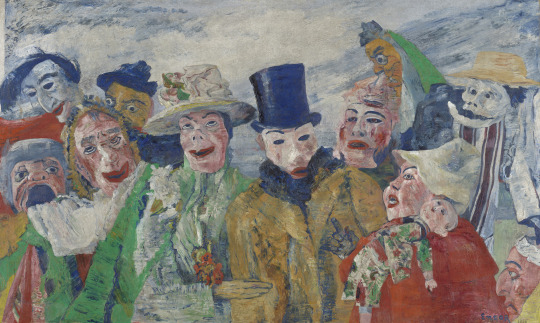
The Intrigue James Ensor (Belgian; 1860–1949) 1890 Oil on canvas Royal Museum of Fine Arts Antwerp (KMSKA), Antwerp, Belgium
#James Ensor#Ensor#Belgian artists#Belgian art#Belgian painters#Belgian paintings#19th century satirical#1890s#Société des Vingt#Les Vingt#Belgian Symbolists#Belgian Symbolism#Belgian Expressionism#Belgian Expressionists#macabre#grotesque#grotesquerie#fin de siècle#couples#Death#top hats#hats#masks#puppets#carnivalesque#crowds#masquerades#Symbolism#Expressionism
36 notes
·
View notes
Text
Anne Rice, IWTV, Part 3, Armand to Louis:
"'It is through you that I can save myself from the despair which I've described to you as our death. It is through you that I must make my link with this nineteenth century and come to understand it in a way that will revitalize me, which I so desperately need. [...] No. I must make contact with the age. [...] And I can do this through you . . . not to learn things from you which I can see in a moment in an art gallery or read in an hour in the thickest books . . . you are the spirit, you are the heart.'
'No, no.' I threw up my hands. I was on the point of a bitter, hysterical laughter. 'Don't you see? I'm not the spirit of any age. I'm at odds with everything and always have been! I have never belonged anywhere with anyone at any time!' It was too painful, too perfectly true.
But his face only brightened with an irresistible smile. He seemed on the verge of laughing at me, and then his shoulders began to move with this laughter. 'But Louis,' he said softly. 'This is the very spirit of your age. Don't you see that? Everyone else feels as you feel. Your fall from grace and faith has been the fall of a century.'"
Alfred de Musset, Confession d'un enfant du siècle, chapitre 2 :
"Trois éléments partageaient donc la vie qui s’offrait alors aux jeunes gens : derrière eux un passé à jamais détruit*, s’agitant encore sur ses ruines, avec tous les fossiles des siècles de l’absolutisme ; devant eux l’aurore d’un immense horizon, les premières clartés de l’avenir** ; et entre ces deux mondes… quelque chose de semblable à l’Océan qui sépare le vieux continent de la jeune Amérique, je ne sais quoi de vague et de flottant, une mer houleuse et pleine de naufrages, traversée de temps en temps par quelque blanche voile lointaine ou par quelque navire soufflant une lourde vapeur ; le siècle présent, en un mot, qui sépare le passé de l’avenir, qui n’est ni l’un ni l’autre et qui ressemble à tous deux à la fois, et où l’on ne sait, à chaque pas qu’on fait, si l’on marche sur une semence ou sur un débris***.
[...] Il leur restait donc le présent, l’esprit du siècle, ange du crépuscule, qui n’est ni la nuit ni le jour ; ils le trouvèrent assis sur un sac de chaux plein d’ossements, serré dans le manteau des égoïstes, et grelottant d’un froid terrible. L’angoisse de la mort leur entra dans l’âme à la vue de ce spectre moitié momie et moitié fœtus**** [...]
Toute la maladie du siècle présent vient de deux causes ; le peuple qui a passé par 93 et par 1814 porte au cœur deux blessures. Tout ce qui était n’est plus, tout ce qui sera n’est pas encore. Ne cherchez pas ailleurs le secret de nos maux*****."
............
Anne Rice definitely read Musset. And Musset would have ADORED Armand and loathed Louis - or maybe the contrary. And depending on when exactly during the 19th century Armand and Louis met, Armand might have already read Musset, and Louis would read him at the end of the century - Confession was published in 1836.
Translations of the passages in bold (translation by me and it's 4am for me right now, so don't expect a perfect work):
*"behind them a past forever destroyed"
**"in front of them, the dawn of an immense horizon, the first lights of the future"
***"the present century, in a word, what separates the past from the future, which is neither one nor the other and which resembles both at the same time, and where one does not know, with each step one takes, if one steps on a seed or rubble"
****"The anguish of death entered their souls at the sight of this specter, half mummy and half fetus."
*****"All that was is no more, all that will be is not yet. Do not look elsewhere for the secret of our ills."
There's a whole Comparative Literature essay that could be written, mirroring Confession with Interview... I will definitely come back to that idea later. Probably. At some point.
#rapha talks#rapha reads#rapha writes#interview with the vampire#iwtv book#anne rice#book quotes#iwtv quotes#armand de romanus#louis de pointe du lac#confession d'un enfant du siècle#alfred de musset#littérature française#french literature#19th century literature#le mal du siècle#me: literature is my passion the love of my life - also me: anyway instead of going and getting degrees in literature i did something else#not to say that i didn't study literature throughout my 6 years of academic career but it wasn't the main focus of my degrees#which i am now kinda regretting - not entirely but i would like to fully study literature only at some point#anyway that wasn't the point of this post#the point of this post is that i read that exchange between armand and louis and my brain immediately went 'musset!!'#i read confession when i was in high school (and extensively studied two of his plays) and got obsessed with this book#because this 'evil of the century' that he writes about can be transposed to any century since the industrial revolution in truth#okay i'll cut the rambling here it's 4am i should probably get some sleep at some point *immediately goes back to finishing iwtv*
6 notes
·
View notes
Text



Satanic occult ceremony ritual dagger, bronze, 19th century.
#bizarre au havre#satanic ritual dagger#satanism#art#sculpture#artist#dagger#ritual#esoteric#dark#the devil#photography#satanic ceremony#bronze#19th century#dague rituel#dague satanique#satanisme#artiste#rituel#ésotérisme#le diable#satan#photographie#cérémonie satanique#19e siècle
19 notes
·
View notes